SoFi Technologies
stock has whipsawed in the days since a quarterly filing revived debate about how the fintech values its loans.
That’s apparent in the stock, which climbed 150% from January to August this year, before settling back to a recent $6.80 and a year-to-date gain of 48%. The company aims to report its first profit according to generally accepted accounting principles this quarter. But with a valuation of 100 times 2024 earnings and about twice its tangible book value, SoFi has attracted scrutiny.
At issue are the main drivers of SoFi’s growth: the personal loans that it originates and then resells to investors. In the September quarter, it made $3.9 billion in personal loans, an increase of 38% from the prior-year quarter. SoFi aims to sell those loans above the loan balances, or “par” value, and it has marked up their “fair value” for expected interest, fees, resale price, loss sharing, and other factors in its financial results. SoFi recognizes that anticipatory markup on its income statement and balance sheet. At September’s end, the fair value markup on its $14.3 billion in personal loans was $569 million, or around 4%.
Since 2018, accounting rules have let lenders choose this fair-value approach for loans they plan to sell off, and SoFi isn’t alone in handling them in this way. Some banks use the approach for their easy-to-value mortgage loans, while others take the more conservative approach of carrying loans at the lesser of cost or market value.
How the loans are valued is not just a debate about accounting practices. Since SoFi marks up the loans when they are made, it provides a boost to both revenue and book value. But that initial mark may not be the value SoFi ultimately realizes from the loan. What’s more, management bonuses, which are calculated mainly from growth in revenue, loans, and customers, according to SoFi’s April proxy statement, could potentially get a lift.
“They would not have been able to grow as fast, had they used conventional held-for-investment accounting,” says Seaport’s Ryan. In a May note, he estimated that fair value accounting had made SoFi’s capital base seem larger by 40%, or some $1.3 billion.
SoFi doesn’t see anything controversial about its accounting. “At time of origination, we mark the loan at the fair value and the premium or discount to par is recognized as revenue in the quarter it occurs,” SoFi financial chief Chris Lapointe said. Over time, SoFi adjusts its value estimates for losses, prepayments, and benchmark rates. It says that over the last two years, the actual cash flow of the loans has been greater than the initial marks and the actual loan sales have been greater than any mark.
The company notes that it hires outside specialists to calculate its fair value marks. Auditor Deloitte & Touche reviews these calculations—flagging them as a “critical audit matter” in its 10-K attestation—because these estimates of future cash flows involve “significant assumptions.”
In the five years that fair value accounting for loans has been allowed, Securities and Exchange Commission filings show that three dozen financial firms have had their auditor flag the practice as a critical audit matter because of its significance to reported results. Five were consumer lenders, including SoFi and its smaller rivals
Upstart Holdings
(UPST),
Enova International
(ENVA),
Atlanticus Holdings
(ATLC), and
Oportun Financial
(OPRT).
Investors were given a sample of SoFi’s gains on loans sold during the September quarter, when it filed its latest 10-Q on Nov. 8. SoFi reported the sale of $15.1 million in personal loans in the quarter—just a sliver of the quarter’s $537 million in net revenue. It got $15.1 million in cash for the loans and booked an additional gain of $767,000 to represent the future fees it will get from the loan buyer. That made for a gain of 5.1% on the $15.1 million loan sale.
That 5.1% gain reported on the $15.1 million in loan sales is evidence that SoFi is warranted in marking up its entire $14 billion loan portfolio by 4%, said CFO Lapointe.
Some analysts, though, have concerns. In a Nov. 10 note, Morgan Stanley analyst Jeffrey Adelson said the 5.1% gain from the sale on the Nov. 8 filing was not a cash payment, but a noncash accounting gain. Crunching some numbers, he concluded that the service fees the gain represents would be much higher than SoFi has reported in the past. Adelson has an Equal Weight rating and a $7 target on the stock.
Wedbush analyst David Chiaverini also said the implied 5.1% servicing fee seems too high. A normal annual servicing fee of 0.58% would discount to a present value of $233,000, he wrote on Nov. 9. That’s far below the $767,000 the company reported. Wedbush rates SoFi an Underperform with a $3 price target.
Mizuho analyst Dan Dolev disagrees, writing that servicing fees can be as high as 3.5% to 4% over 36 months. That leads him to a present value of about $750,000. “You can easily back into their numbers,” he told Barron’s. “So I know the servicing fees [are] a little higher than usual. But the math works perfectly well.” Mizuho rates SoFi a Buy, with a price target of $15.
SoFi’s Lapointe said that the gain on September quarter loan sales reflects no aggressive accounting assumptions. He explained that loan transactions are structured so that purchasers pay a certain amount up front and then pay a fixed servicing percentage over the life of the loan. “None of these are assumptions-driven when it comes to this specific servicing fee itself,” he said. “That’s a contractual fixed obligation that the buyer has to pay.”
“This is a servicing fee that is higher than what we have done historically, but the upfront fee was lower,” he said of the quarter’s loan sales. “At the end of the day, all of these deals are structured differently.”
Shareholders will get their next report on SoFI’s loan-sale gains when it releases its fourth-quarter results, which last arrived in January. But SoFi offered an early example on Nov. 14, when Lapointe told a Stephens investment conference that the company has closed on a previously disclosed $375 million personal loan securitization with
BlackRock,
at a 5% gain.
Investors didn’t come away reassured, however, because LaPointe also acknowledged that it sometimes agrees to share future losses when selling loans—including September’s $15.1 million deal. SoFi stock fell 9% in Thursday trading, before gaining 1.8% at on Friday.
“We fear that as more of these deals are executed,” Wedbush’s Chiaverini wrote in a Thursday note, “SoFi may be subject to loss risk on both its own balance sheet loans as well as owning a portion of risk from off-balance sheet loans that it has sold to third parties.”
One thing investors can count on: The debate is far from over.
Write to Emily Dattilo at [email protected] and Bill Alpert at [email protected]
Read the full article here









